#include <BUBasicBlockScheduler.hh>

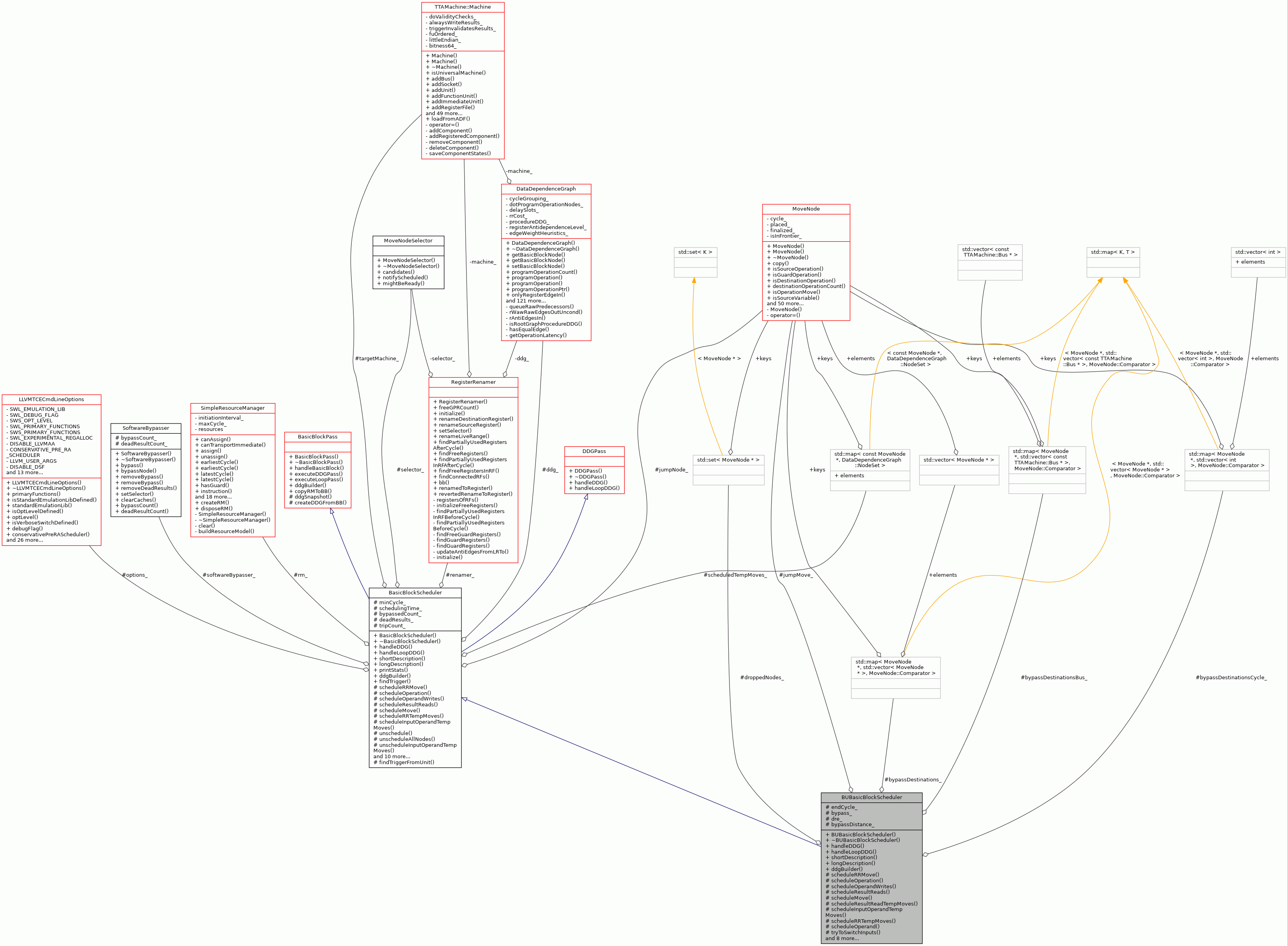
Classes | |
| struct | ltstr |
Protected Types | |
| typedef std::set< MoveNode *, ltstr > | OrderedSet |
Protected Attributes | |
| MoveNode * | jumpMove_ |
| std::map< MoveNode *, std::vector< MoveNode * >, MoveNode::Comparator > | bypassDestinations_ |
| std::map< MoveNode *, std::vector< int >, MoveNode::Comparator > | bypassDestinationsCycle_ |
| std::map< MoveNode *, std::vector< const TTAMachine::Bus * >, MoveNode::Comparator > | bypassDestinationsBus_ |
| std::set< MoveNode * > | droppedNodes_ |
| unsigned int | endCycle_ |
| bool | bypass_ |
| bool | dre_ |
| int | bypassDistance_ |
 Protected Attributes inherited from BasicBlockScheduler Protected Attributes inherited from BasicBlockScheduler | |
| const TTAMachine::Machine * | targetMachine_ |
| The target machine we are scheduling the program against. | |
| DataDependenceGraph * | ddg_ |
| DDG of the currently scheduled BB. | |
| SimpleResourceManager * | rm_ |
| Resource Manager of the currently scheduled BB. | |
| std::map< const MoveNode *, DataDependenceGraph::NodeSet > | scheduledTempMoves_ |
| Stores the MoveNodes that were scheduled as temp moves during scheduling of the operand move. | |
| SoftwareBypasser * | softwareBypasser_ |
| The software bypasser to use to bypass registers when possible. | |
| RegisterRenamer * | renamer_ |
| int | minCycle_ |
| The earliest cycle to schedule moves in. Used to leave room for sched_yield() by the sched_yield() emitter. | |
| MoveNodeSelector * | selector_ |
| int | bypassedCount_ |
| int | deadResults_ |
| LLVMTCECmdLineOptions * | options_ |
| MoveNode * | jumpNode_ |
| int | tripCount_ |
Additional Inherited Members | |
 Static Public Member Functions inherited from BasicBlockScheduler Static Public Member Functions inherited from BasicBlockScheduler | |
| static MoveNode * | findTrigger (const ProgramOperation &po, const TTAMachine::Machine &mach) |
 Static Public Member Functions inherited from BasicBlockPass Static Public Member Functions inherited from BasicBlockPass | |
| static void | copyRMToBB (SimpleResourceManager &rm, TTAProgram::BasicBlock &bb, const TTAMachine::Machine &targetMachine, TTAProgram::InstructionReferenceManager &irm, int lastCycle=-1) |
 Static Protected Member Functions inherited from BasicBlockScheduler Static Protected Member Functions inherited from BasicBlockScheduler | |
| static MoveNode * | findTriggerFromUnit (const ProgramOperation &po, const TTAMachine::Unit &unit) |
Detailed Description
A class that implements the functionality of a bottom up basic block scheduler.
Schedules the program one basic block at a time. Does not fill delay slots if they couldn't be filled with the basic block's contents itself (no instruction importing).
Definition at line 61 of file BUBasicBlockScheduler.hh.
Member Typedef Documentation
◆ OrderedSet
|
protected |
Definition at line 97 of file BUBasicBlockScheduler.hh.
Constructor & Destructor Documentation
◆ BUBasicBlockScheduler()
| BUBasicBlockScheduler::BUBasicBlockScheduler | ( | InterPassData & | data, |
| SoftwareBypasser * | bypasser = NULL, |
||
| RegisterRenamer * | renamer = NULL |
||
| ) |
Constructs the basic block scheduler.
- Parameters
-
data Interpass data bypasser Helper module implementing software bypassing delaySlotFiller Helper module implementing jump delay slot filling registerRenamer Helper module implementing register renaming
Definition at line 86 of file BUBasicBlockScheduler.cc.
References Application::cmdLineOptions(), jumpMove_, and BasicBlockScheduler::options_.

◆ ~BUBasicBlockScheduler()
|
virtual |
Member Function Documentation
◆ bypassNode()
|
protected |
Tries to bypass node with all of it's successors.
- Parameters
-
moveNode,node which is tried to bypass maxResultCycle,cycle of latest of rescheduled nodes
- Returns
- True if all of the successors were successfully bypassed
Definition at line 1601 of file BUBasicBlockScheduler.cc.
References assert, bypass_, bypassDestinations_, bypassDestinationsBus_, bypassDestinationsCycle_, bypassDistance_, DataDependenceGraph::copyDepsOver(), MoveNode::cycle(), BasicBlockScheduler::ddg_, findBypassDestinations(), DataDependenceGraph::firstScheduledRegisterRead(), DataDependenceGraph::guardsAllowBypass(), MoveNode::isDestinationVariable(), MoveNode::isScheduled(), MoveNode::isSourceVariable(), DataDependenceGraph::lastScheduledRegisterRead(), DataDependenceGraph::mergeAndKeepUser(), DataDependenceGraph::onlyRegisterRawDestinations(), DataDependenceGraph::resultUsed(), BasicBlockScheduler::rm_, scheduleMove(), BasicBlockScheduler::succeedingTempMove(), MoveNode::toString(), undoBypass(), BasicBlockScheduler::unschedule(), and GraphBase< GraphNode, GraphEdge >::writeToDotFile().
Referenced by handleDDG(), handleLoopDDG(), scheduleResultReads(), scheduleResultReadTempMoves(), and scheduleRRTempMoves().
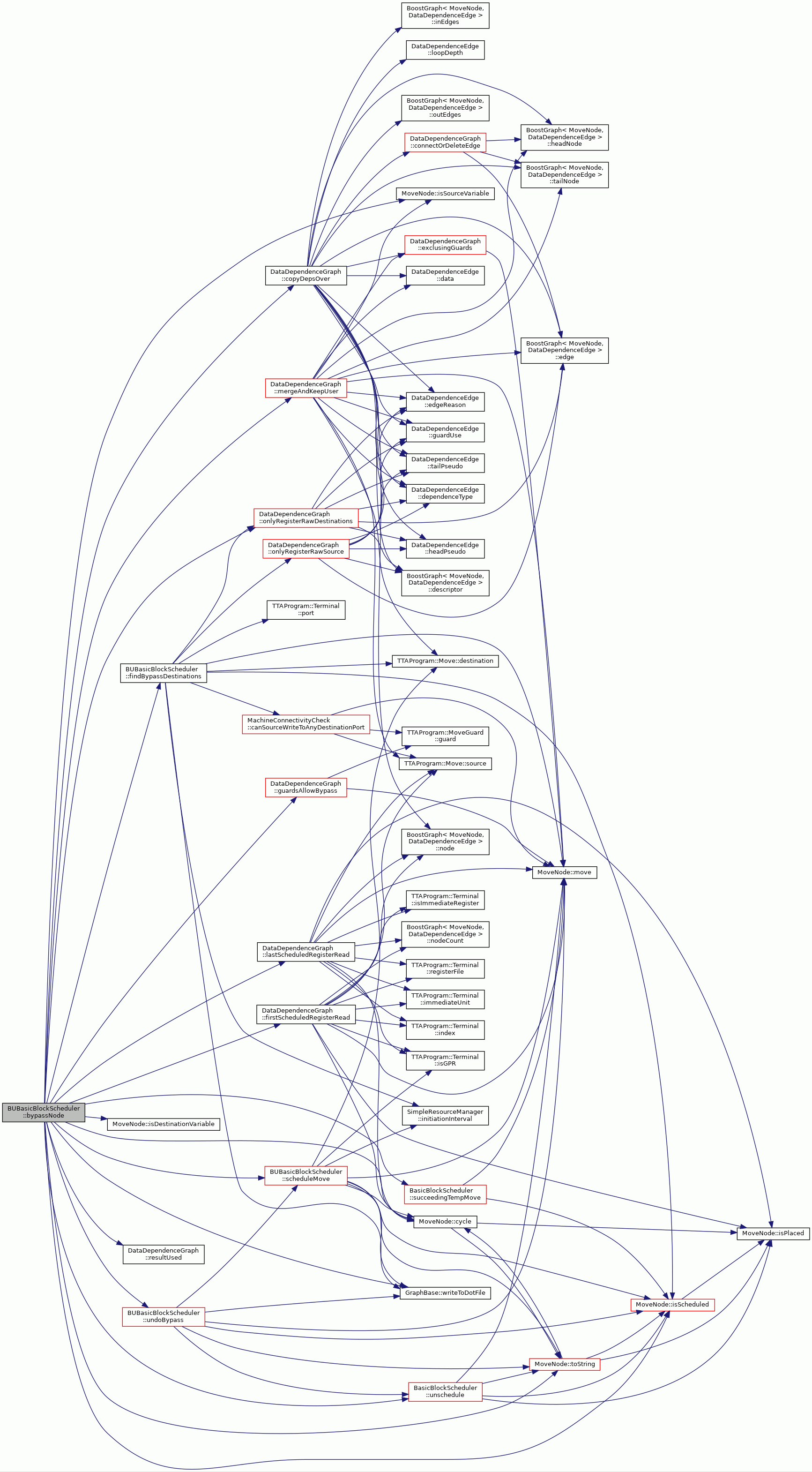
◆ clearRemovedNodes()
|
protected |
Finaly, remove moves that were dropped during dead result move elimination also from the parent of the given subgraph DDG.
Definition at line 1873 of file BUBasicBlockScheduler.cc.
References bypassDestinations_, bypassDestinationsBus_, bypassDestinationsCycle_, MapTools::containsKey(), BasicBlockScheduler::ddg_, droppedNodes_, MoveNode::isScheduled(), BoostGraph< GraphNode, GraphEdge >::removeNode(), and BoostGraph< GraphNode, GraphEdge >::rootGraph().
Referenced by handleDDG(), and handleLoopDDG().

◆ ddgBuilder()
|
inlinevirtual |
◆ finalizeSchedule()
|
protected |
Definition at line 1743 of file BUBasicBlockScheduler.cc.
References __func__, assert, bypassDestinations_, MapTools::containsKey(), BasicBlockScheduler::ddg_, TTAProgram::Move::destination(), dre_, BoostGraph< GraphNode, GraphEdge >::dropNode(), droppedNodes_, TTAProgram::Terminal::equals(), MoveNode::isDestinationVariable(), MoveNode::isScheduled(), MoveNode::isSourceVariable(), BUMoveNodeSelector::mightBeReady(), MoveNode::move(), BUMoveNodeSelector::notifyScheduled(), BoostGraph< GraphNode, GraphEdge >::predecessors(), DataDependenceGraph::resultUsed(), BoostGraph< GraphNode, GraphEdge >::rootGraph(), BasicBlockScheduler::scheduledTempMoves_, TTAProgram::Move::source(), MoveNode::toString(), and GraphBase< GraphNode, GraphEdge >::writeToDotFile().
Referenced by handleDDG(), handleLoopDDG(), scheduleOperation(), scheduleResultReadTempMoves(), and scheduleRRTempMoves().
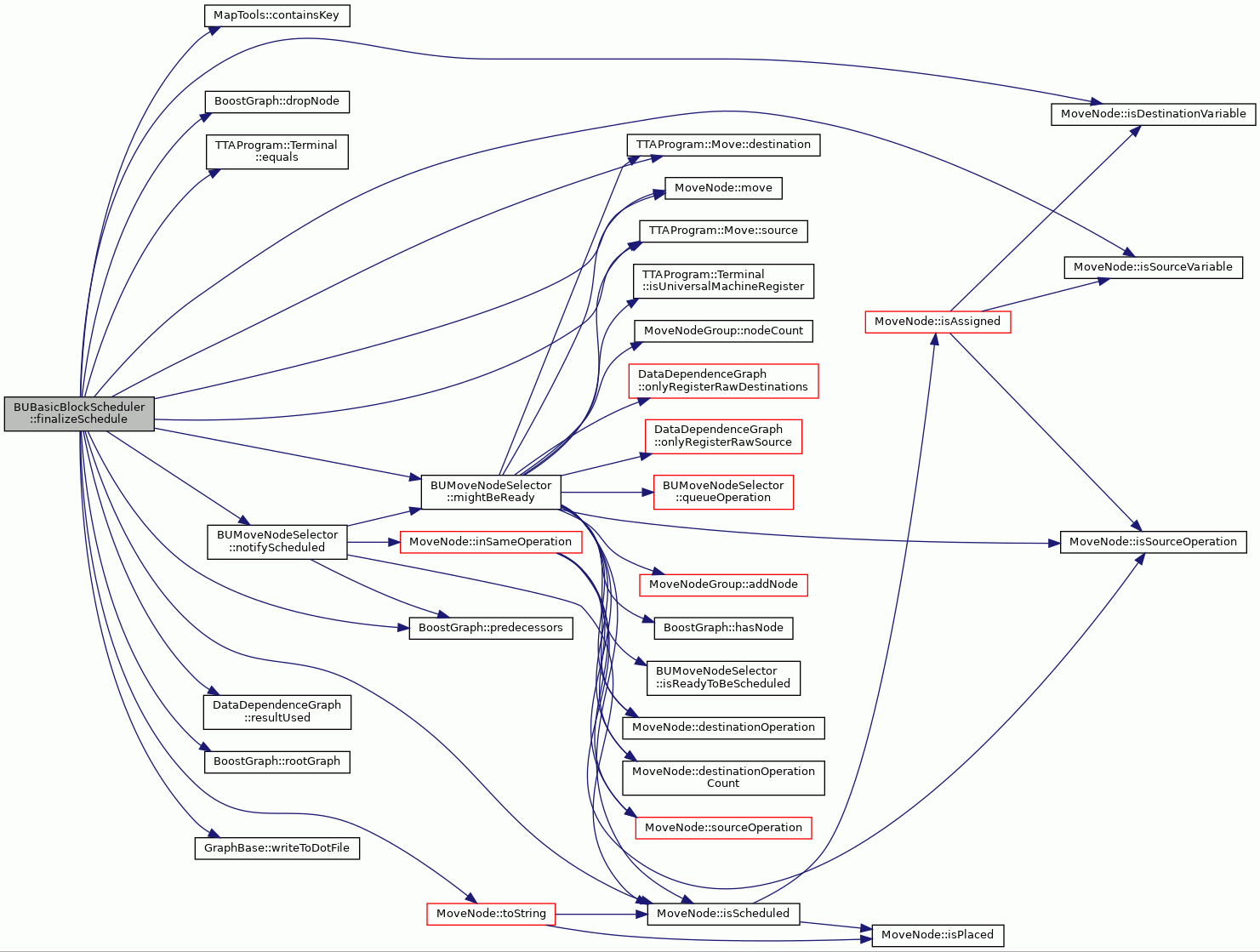
◆ findBypassDestinations()
|
protected |
Finds a destination where to bypass.
Goes through ddg and checks for connectivity.
- Returns
- pair of destination of bypass and amount of regs skipped by the bypass.
Definition at line 1487 of file BUBasicBlockScheduler.cc.
References MachineConnectivityCheck::canSourceWriteToAnyDestinationPort(), BasicBlockScheduler::ddg_, TTAProgram::Move::destination(), SimpleResourceManager::initiationInterval(), MoveNode::isScheduled(), MoveNode::move(), DataDependenceGraph::onlyRegisterRawDestinations(), DataDependenceGraph::onlyRegisterRawSource(), TTAProgram::Terminal::port(), BasicBlockScheduler::rm_, and GraphBase< GraphNode, GraphEdge >::writeToDotFile().
Referenced by bypassNode().
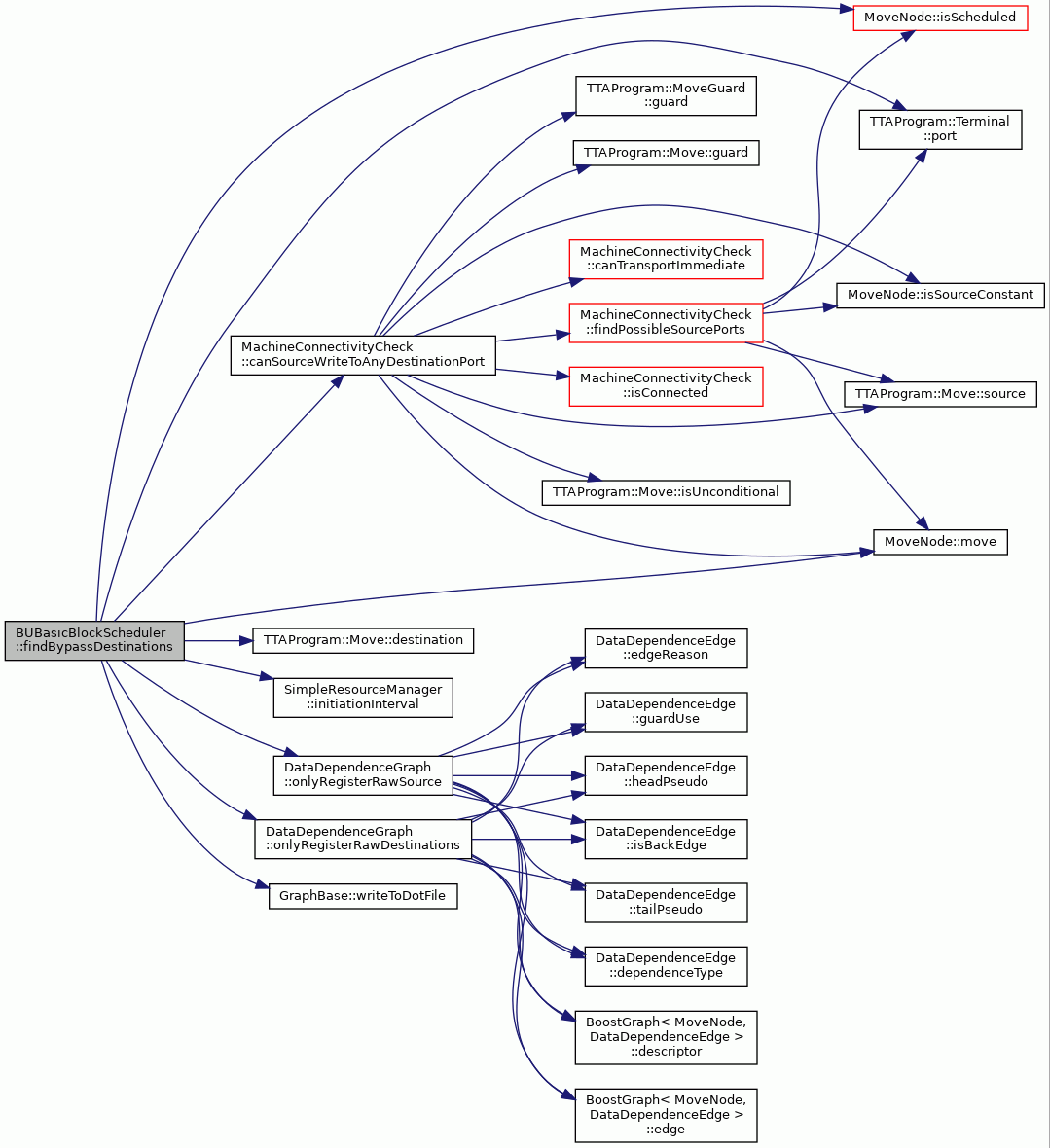
◆ handleDDG()
|
virtual |
Schedules a piece of code in a DDG
- Parameters
-
ddg The ddg containing the code rm Resource manager that is to be used. targetMachine The target machine.
- Exceptions
-
Exception several TCE exceptions can be thrown in case of a scheduling error.
Reimplemented from BasicBlockScheduler.
Definition at line 113 of file BUBasicBlockScheduler.cc.
References __func__, abortWithError, bypass_, SchedulerCmdLineOptions::bypassDistance(), bypassDistance_, bypassNode(), BUMoveNodeSelector::candidates(), clearRemovedNodes(), BasicBlockScheduler::ddg_, BasicBlockScheduler::ddgSnapshot(), debugLog, TTAProgram::Move::destination(), dre_, DataDependenceGraph::DUMP_DOT, DataDependenceGraph::DUMP_XML, LLVMTCECmdLineOptions::dumpDDGsDot(), LLVMTCECmdLineOptions::dumpDDGsXML(), endCycle_, finalizeSchedule(), RegisterRenamer::initialize(), MoveNode::isMove(), MoveNode::isOperationMove(), TTAProgram::Terminal::isRA(), MoveNodeGroup::isScheduled(), MoveNode::isScheduled(), SchedulerCmdLineOptions::killDeadResults(), SimpleResourceManager::largestCycle(), MoveNode::move(), BoostGraph< GraphNode, GraphEdge >::node(), MoveNodeGroup::node(), MoveNodeGroup::nodeCount(), BoostGraph< GraphNode, GraphEdge >::nodeCount(), BasicBlockScheduler::options_, BasicBlockScheduler::renamer_, DataDependenceGraph::resultUsed(), BasicBlockScheduler::rm_, DataDependenceGraph::scheduledNodeCount(), scheduleMove(), scheduleOperation(), scheduleRRMove(), BasicBlockScheduler::selector_, SimpleResourceManager::setMaxCycle(), RegisterRenamer::setSelector(), SimpleResourceManager::smallestCycle(), BasicBlockScheduler::targetMachine_, MoveNode::toString(), undoBypass(), unscheduleAllNodes(), and GraphBase< GraphNode, GraphEdge >::writeToDotFile().
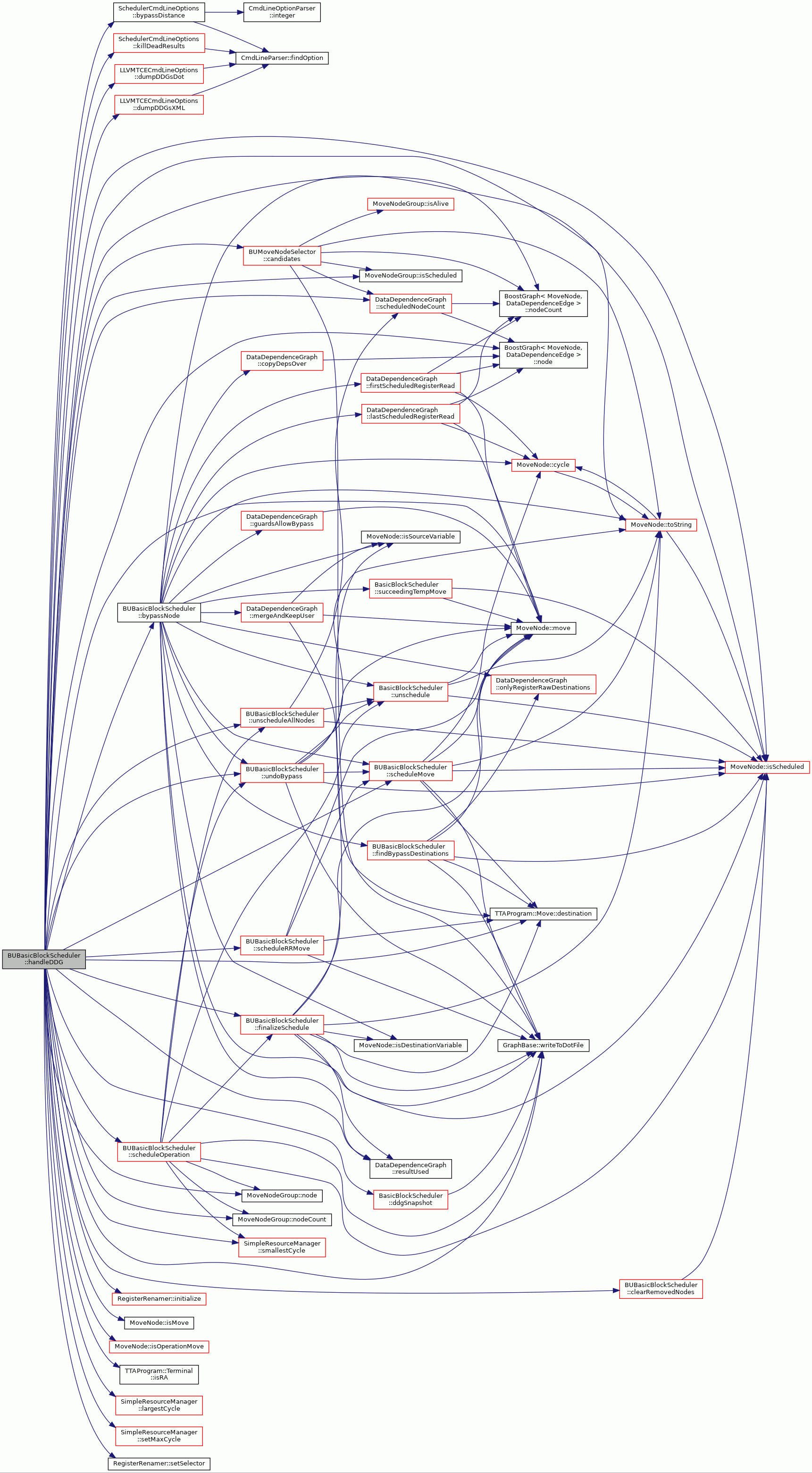
◆ handleLoopDDG()
|
virtual |
Schedules loop in a DDG
- Parameters
-
ddg The ddg containing the loop rm Resource manager that is to be used. targetMachine The target machine.
- Exceptions
-
Exception several TCE exceptions can be thrown in case of a scheduling error.
- Returns
- negative if failed, else overlapcount.
Reimplemented from BasicBlockScheduler.
Definition at line 260 of file BUBasicBlockScheduler.cc.
References abortWithError, bypass_, SchedulerCmdLineOptions::bypassDistance(), bypassDistance_, bypassNode(), BUMoveNodeSelector::candidates(), clearRemovedNodes(), BasicBlockScheduler::ddg_, BasicBlockScheduler::ddgSnapshot(), debugLog, TTAProgram::Move::destination(), dre_, DataDependenceGraph::DUMP_DOT, DataDependenceGraph::DUMP_XML, LLVMTCECmdLineOptions::dumpDDGsDot(), LLVMTCECmdLineOptions::dumpDDGsXML(), endCycle_, finalizeSchedule(), DataDependenceGraph::findLoopLimitAndIndex(), RegisterRenamer::initialize(), SimpleResourceManager::initiationInterval(), MoveNode::isMove(), MoveNode::isOperationMove(), TTAProgram::Terminal::isRA(), MoveNodeGroup::isScheduled(), jumpMove_, SchedulerCmdLineOptions::killDeadResults(), DataDependenceGraph::largestCycle(), Application::logStream(), BasicBlockScheduler::minCycle_, MoveNode::move(), BoostGraph< GraphNode, GraphEdge >::node(), MoveNodeGroup::node(), MoveNodeGroup::nodeCount(), BoostGraph< GraphNode, GraphEdge >::nodeCount(), BasicBlockScheduler::notifyScheduled(), BasicBlockScheduler::options_, BasicBlockScheduler::renamer_, DataDependenceGraph::resultUsed(), BasicBlockScheduler::rm_, DataDependenceGraph::scheduledNodeCount(), BasicBlockScheduler::scheduledTempMoves_, scheduleMove(), scheduleOperation(), scheduleRRMove(), RegisterRenamer::setSelector(), TTAProgram::Move::setSource(), DataDependenceGraph::smallestCycle(), SimpleResourceManager::smallestCycle(), TTAProgram::Move::source(), BasicBlockScheduler::targetMachine_, Conversion::toString(), BasicBlockScheduler::tripCount_, unscheduleAllNodes(), SimValue::unsignedValue(), TTAProgram::TerminalImmediate::value(), SimValue::width(), and GraphBase< GraphNode, GraphEdge >::writeToDotFile().
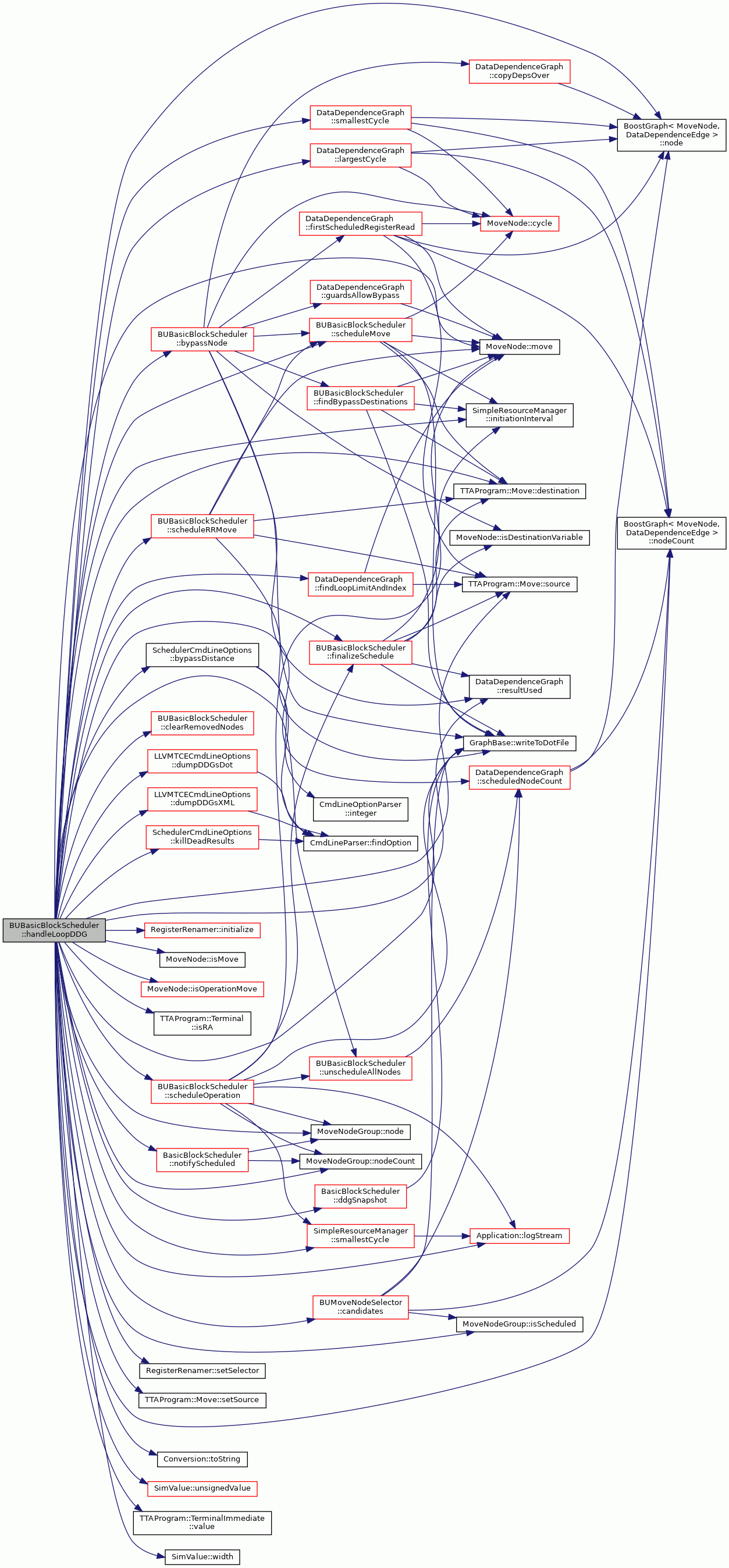
◆ longDescription()
|
virtual |
Optional longer description of the pass.
This description can include usage instructions, details of choice of algorithmic details, etc.
- Returns
- The description as a string.
Reimplemented from BasicBlockScheduler.
Definition at line 1209 of file BUBasicBlockScheduler.cc.
◆ precedingTempMove()
Finds the temp move preceding the given movenode.
If it does not have one, returns null.
- Parameters
-
current MoveNode whose tempmoves we are searching
- Returns
- tempMove preceding given node, or null if does not exist.
Definition at line 1424 of file BUBasicBlockScheduler.cc.
References TTAProgram::ProgramAnnotation::ANN_CONNECTIVITY_MOVE, assert, BasicBlockScheduler::ddg_, TTAProgram::AnnotatedInstructionElement::hasAnnotations(), MoveNode::isScheduled(), MoveNode::move(), and BoostGraph< GraphNode, GraphEdge >::predecessors().
Referenced by scheduleOperand().

◆ scheduleInputOperandTempMoves()
|
protected |
Schedules the (possible) temporary register copy moves (due to missing connectivity) preceeding the given input move.
The function recursively goes through all the temporary moves added to the given input move.
- Parameters
-
operandMove A temp move whose predecessor has to be scheduled. operandWrite The original move of which temp moves to schedule.
Definition at line 1289 of file BUBasicBlockScheduler.cc.
References TTAProgram::ProgramAnnotation::ANN_CONNECTIVITY_MOVE, assert, MoveNode::cycle(), BasicBlockScheduler::ddg_, DataDependenceEdge::DEP_RAW, TTAProgram::Move::destination(), DataDependenceEdge::EDGE_REGISTER, endCycle_, DataDependenceGraph::firstScheduledRegisterRead(), TTAProgram::AnnotatedInstructionElement::hasAnnotations(), TTAProgram::Terminal::index(), BoostGraph< GraphNode, GraphEdge >::inEdges(), MoveNode::isScheduled(), Application::logStream(), MoveNode::move(), TTAProgram::Terminal::registerFile(), BasicBlockScheduler::scheduledTempMoves_, scheduleInputOperandTempMoves(), scheduleMove(), BoostGraph< GraphNode, GraphEdge >::tailNode(), MoveNode::toString(), and GraphBase< GraphNode, GraphEdge >::writeToDotFile().
Referenced by scheduleInputOperandTempMoves(), and scheduleOperand().
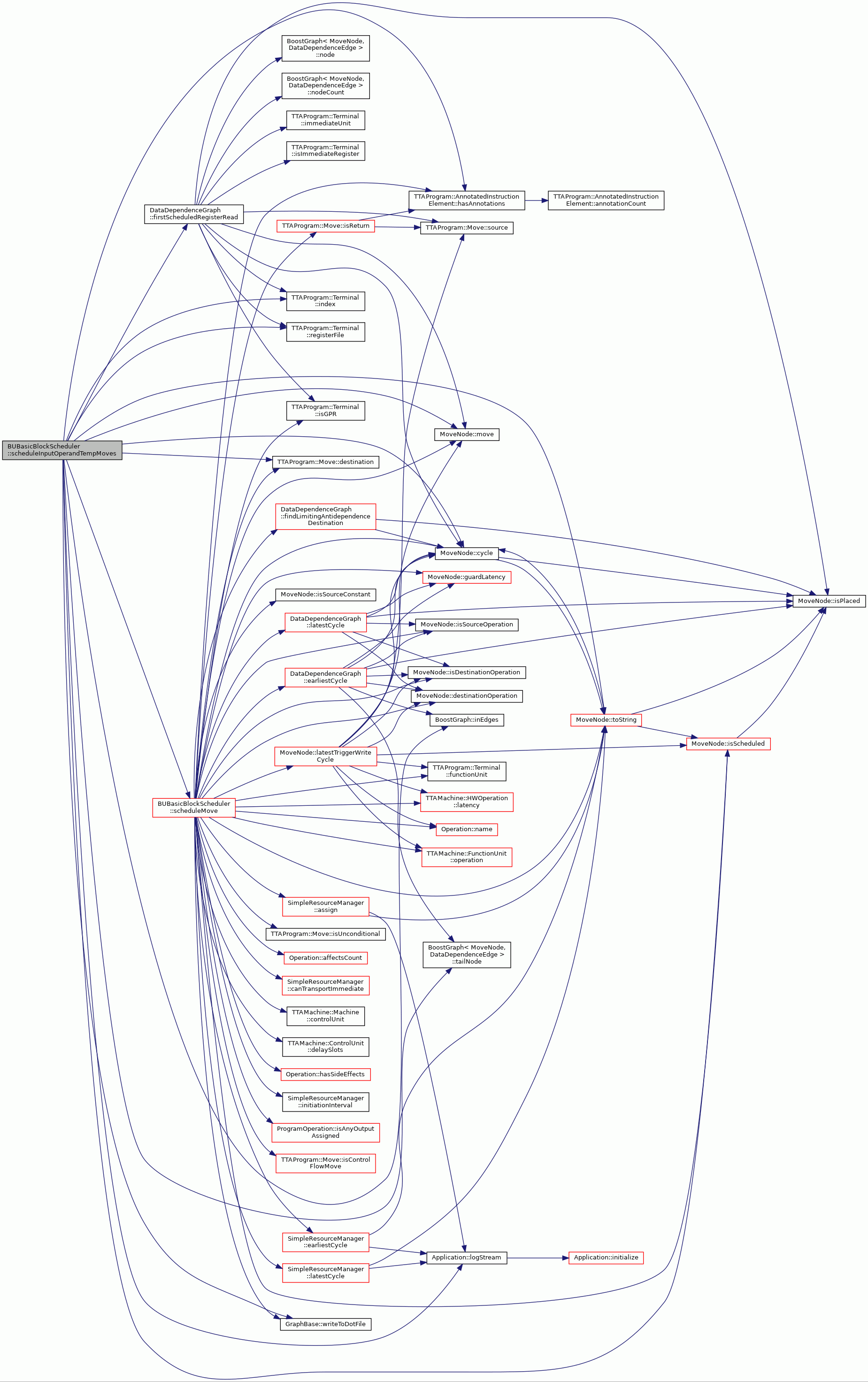
◆ scheduleMove()
|
protected |
Schedules a single move to the earliest possible cycle, taking in account the DDG, resource constraints, and latencies in producing source values.
This method assumes the move is possible to schedule with regards to connectivity and resources. Short immediates are converted to long immediates when needed.
- Parameters
-
move The move to schedule. earliestCycle The earliest cycle to try.
Definition at line 959 of file BUBasicBlockScheduler.cc.
References __func__, Operation::affectsCount(), TTAProgram::ProgramAnnotation::ANN_REQUIRES_LIMM, TTAProgram::ProgramAnnotation::ANN_STACKFRAME_PROCEDURE_RETURN, assert, SimpleResourceManager::assign(), SimpleResourceManager::canTransportImmediate(), TTAMachine::Machine::controlUnit(), MoveNode::cycle(), BasicBlockScheduler::ddg_, TTAMachine::ControlUnit::delaySlots(), TTAProgram::Move::destination(), MoveNode::destinationOperation(), DataDependenceGraph::earliestCycle(), SimpleResourceManager::earliestCycle(), endCycle_, DataDependenceGraph::findLimitingAntidependenceDestination(), TTAProgram::Terminal::functionUnit(), MoveNode::guardLatency(), TTAProgram::AnnotatedInstructionElement::hasAnnotations(), Operation::hasSideEffects(), SimpleResourceManager::initiationInterval(), ProgramOperation::isAnyOutputAssigned(), TTAProgram::Move::isControlFlowMove(), MoveNode::isDestinationOperation(), TTAProgram::Terminal::isGPR(), TTAProgram::Move::isReturn(), MoveNode::isScheduled(), MoveNode::isSourceConstant(), MoveNode::isSourceOperation(), TTAProgram::Move::isUnconditional(), jumpMove_, TTAMachine::HWOperation::latency(), DataDependenceGraph::latestCycle(), SimpleResourceManager::latestCycle(), MoveNode::latestTriggerWriteCycle(), MoveNode::move(), Operation::name(), ProgramOperation::operation(), TTAMachine::FunctionUnit::operation(), ProgramOperation::outputMove(), ProgramOperation::outputMoveCount(), DataDependenceGraph::removeIncomingGuardEdges(), RegisterRenamer::renameDestinationRegister(), BasicBlockScheduler::renamer_, RegisterRenamer::renameSourceRegister(), BasicBlockScheduler::rm_, TTAProgram::AnnotatedInstructionElement::setAnnotation(), TTAProgram::Move::setGuard(), MoveNode::sourceOperation(), BasicBlockScheduler::targetMachine_, MoveNode::toString(), tryToOptimizeWaw(), SimpleResourceManager::unassign(), Operation::writesMemory(), and GraphBase< GraphNode, GraphEdge >::writeToDotFile().
Referenced by bypassNode(), handleDDG(), handleLoopDDG(), scheduleInputOperandTempMoves(), scheduleOperand(), scheduleResultReads(), scheduleResultReadTempMoves(), scheduleRRMove(), scheduleRRTempMoves(), tryToOptimizeWaw(), and undoBypass().
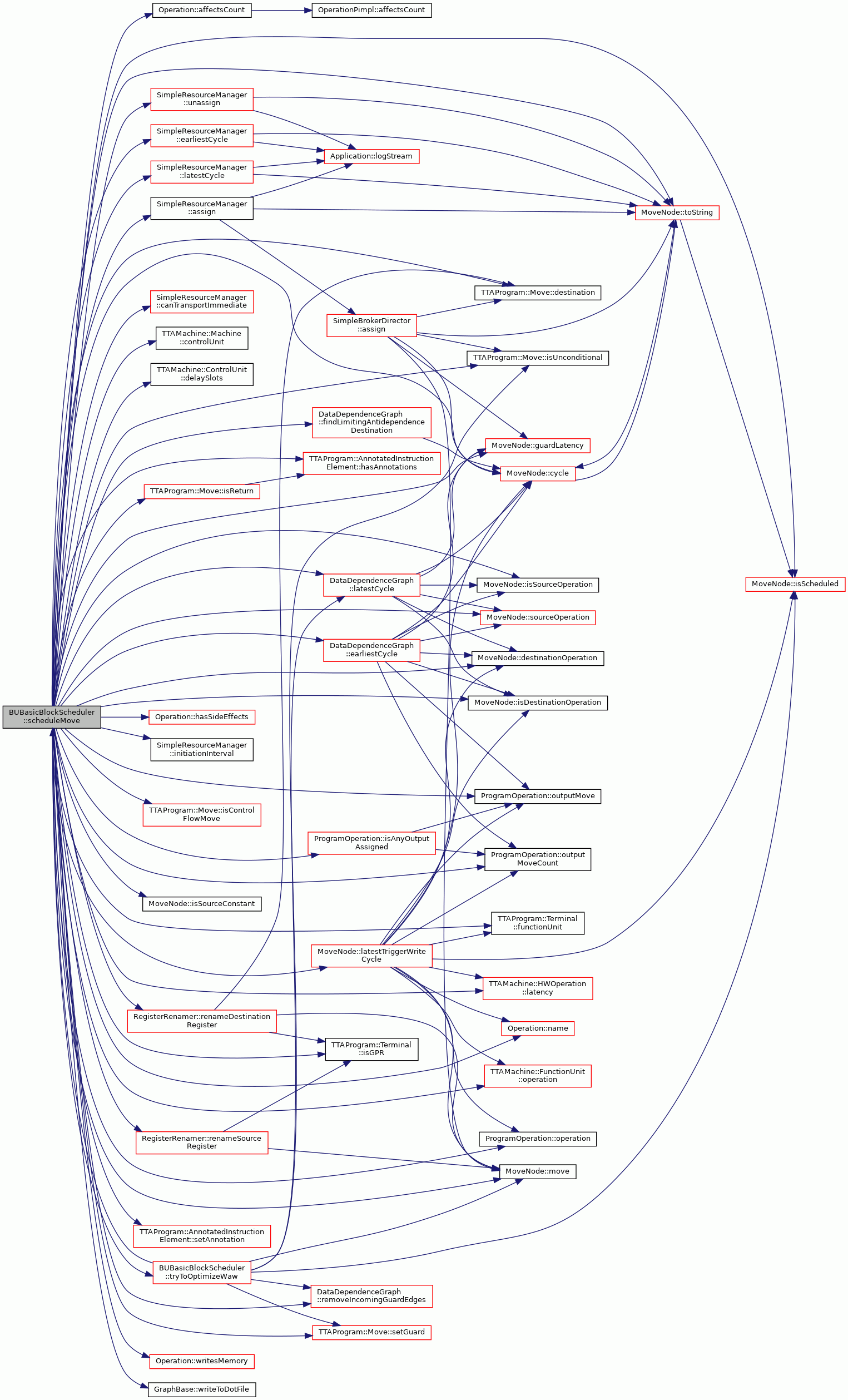
◆ scheduleOperand()
|
protected |
Checks existence of temporary moves and schedules operand according to discovered dependencies.
Definition at line 1448 of file BUBasicBlockScheduler.cc.
References assert, MoveNode::cycle(), BasicBlockScheduler::ddg_, DataDependenceGraph::firstScheduledRegisterWrite(), TTAProgram::Terminal::index(), MoveNode::isScheduled(), MoveNode::move(), precedingTempMove(), TTAProgram::Terminal::registerFile(), scheduleInputOperandTempMoves(), scheduleMove(), and TTAProgram::Move::source().
Referenced by scheduleOperandWrites().
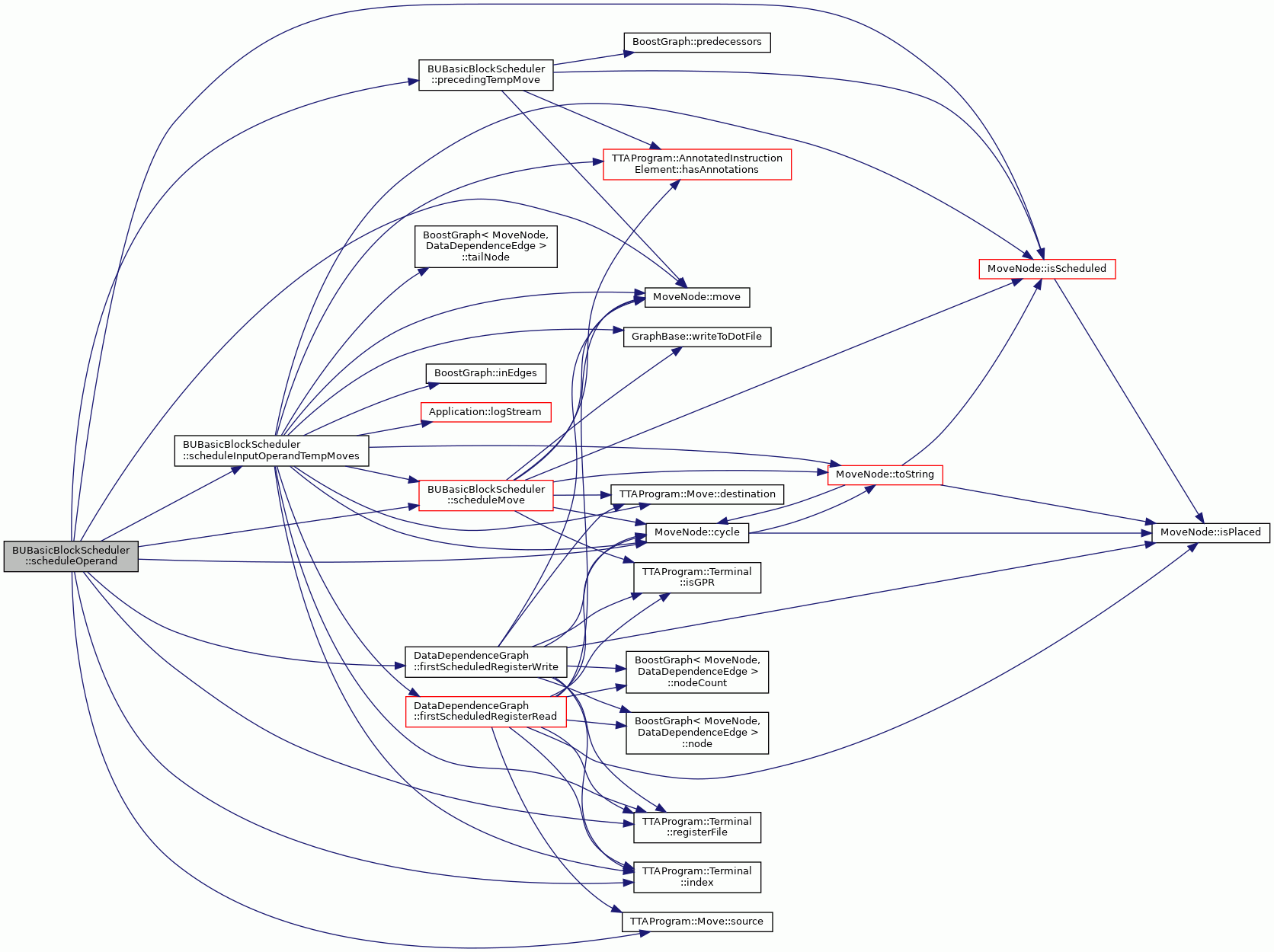
◆ scheduleOperandWrites()
|
protected |
Schedules operand moves of an operation execution.
Assumes the given MoveNodeGroup contains all moves in the operation execution. Also assumes that all result moves of the MoveNodeGroup have been scheduled. Assumes bottom up scheduling.
- Parameters
-
moves Moves of the operation execution. cycle latest cycle for starting scheduling of operands
- Returns
- True if all operands got scheduled
Definition at line 663 of file BUBasicBlockScheduler.cc.
References assert, MoveNode::cycle(), BasicBlockScheduler::ddg_, TTAProgram::Move::destination(), MoveNode::destinationOperation(), BasicBlockScheduler::findTrigger(), BoostGraph< GraphNode, GraphEdge >::hasNode(), SimpleResourceManager::initiationInterval(), MoveNode::isDestinationOperation(), MoveNode::isScheduled(), MoveNode::isSourceOperation(), TTAProgram::Terminal::isTriggering(), DataDependenceGraph::latestCycle(), SimpleResourceManager::latestCycle(), MoveNode::latestTriggerWriteCycle(), MoveNode::move(), DataDependenceGraph::moveFUDependenciesToTrigger(), MoveNodeGroup::node(), MoveNodeGroup::nodeCount(), BasicBlockScheduler::rm_, scheduleOperand(), MoveNode::sourceOperation(), BasicBlockScheduler::targetMachine_, MoveNode::toString(), BasicBlockScheduler::unschedule(), and BasicBlockScheduler::unscheduleInputOperandTempMoves().
Referenced by scheduleOperation().
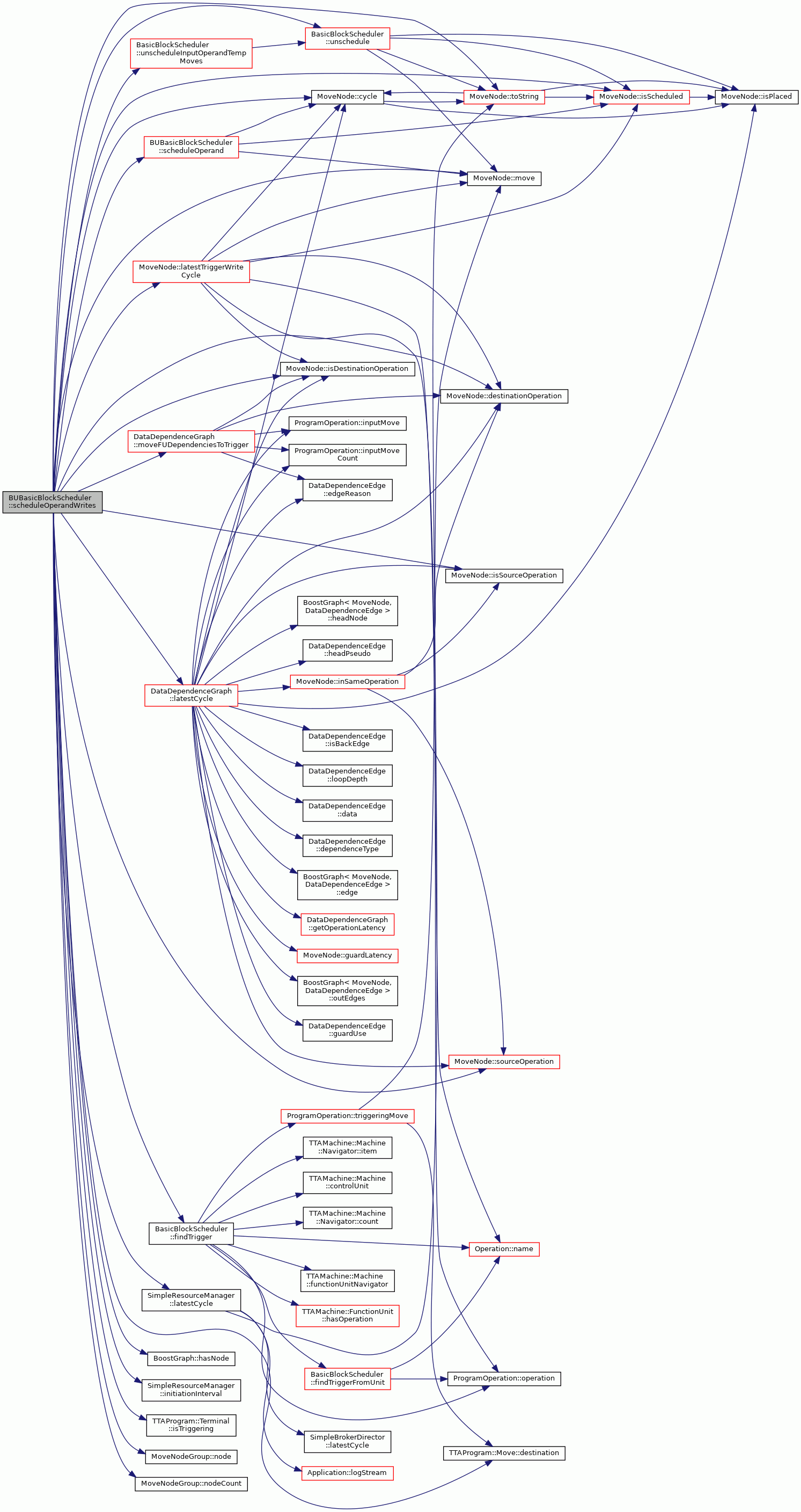
◆ scheduleOperation()
|
protected |
Schedules moves in a single operation execution.
Assumes the given MoveNodeGroup contains all moves in the operation execution. Also assumes that all outputs of the MoveNodeGroup have been scheduled.
- Parameters
-
moves Moves of the operation execution.
Definition at line 454 of file BUBasicBlockScheduler.cc.
References __func__, RegisterCopyAdder::addMinimumRegisterCopies(), bypass_, RegisterCopyAdder::AddedRegisterCopies::count_, BasicBlockScheduler::ddg_, MoveNode::destinationOperation(), endCycle_, finalizeSchedule(), SimpleResourceManager::initiationInterval(), ProgramOperation::inputMove(), ProgramOperation::inputMoveCount(), SchedulerPass::interPassData(), MoveNode::isDestinationOperation(), MoveNode::isScheduled(), MoveNode::isSourceOperation(), Application::logStream(), BoostGraph< GraphNode, GraphEdge >::name(), MoveNodeGroup::node(), MoveNodeGroup::nodeCount(), RegisterCopyAdder::operandsScheduled(), ProgramOperation::outputMove(), ProgramOperation::outputMoveCount(), RegisterCopyAdder::resultsScheduled(), BasicBlockScheduler::rm_, scheduleOperandWrites(), scheduleResultReads(), BasicBlockScheduler::selector_, DataDependenceGraph::setCycleGrouping(), SimpleResourceManager::smallestCycle(), MoveNode::sourceOperation(), BasicBlockScheduler::targetMachine_, MoveNodeGroup::toString(), tryToSwitchInputs(), undoBypass(), BasicBlockScheduler::unschedule(), unscheduleAllNodes(), BasicBlockScheduler::unscheduleInputOperandTempMoves(), BasicBlockScheduler::unscheduleResultReadTempMoves(), and GraphBase< GraphNode, GraphEdge >::writeToDotFile().
Referenced by handleDDG(), and handleLoopDDG().
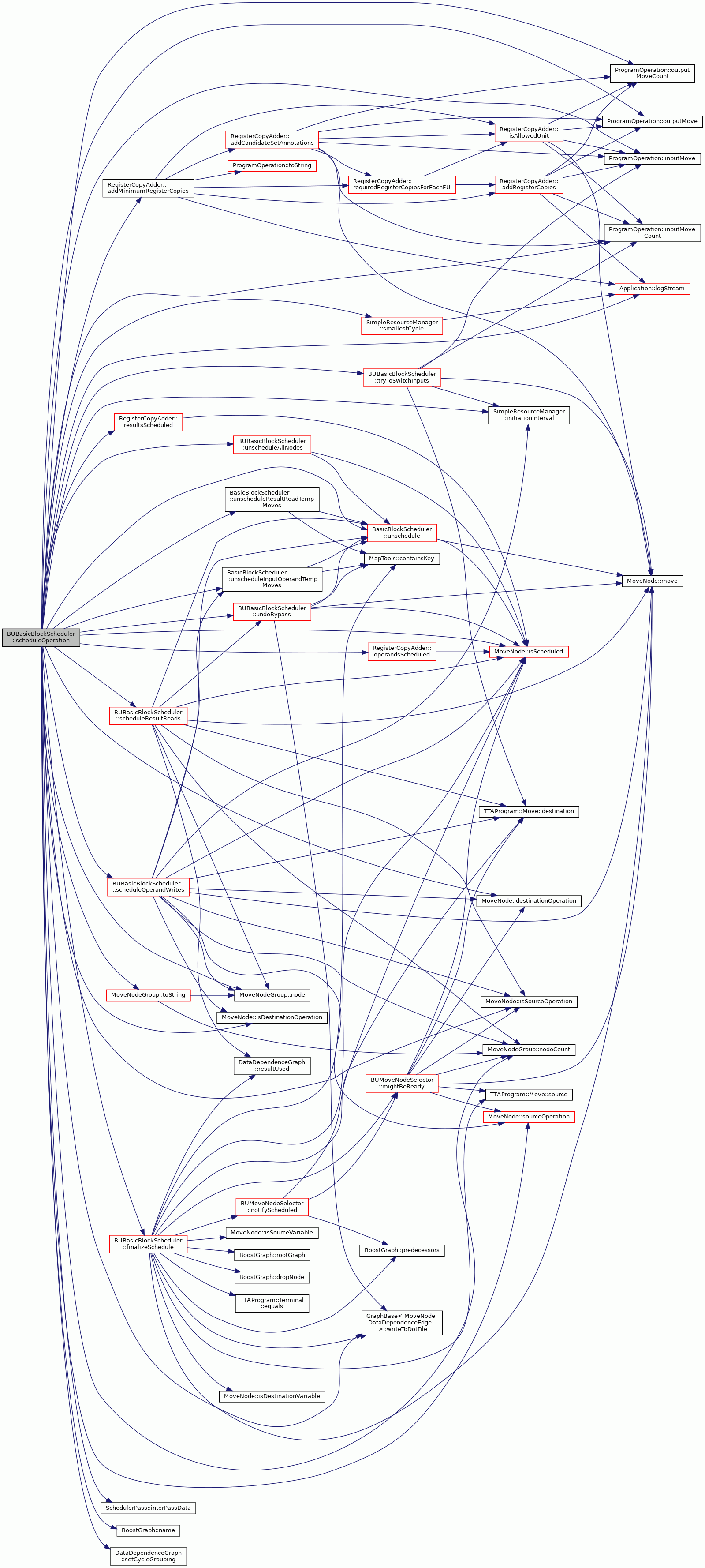
◆ scheduleResultReads()
|
protected |
Schedules the result read moves of an operation execution.
Assumes the given MoveNodeGroup contains all moves in the operation execution.
- Parameters
-
moves Moves of the operation execution.
- Returns
- Last cycle in which any of the results was scheduled
Definition at line 804 of file BUBasicBlockScheduler.cc.
References __func__, assert, bypassDistance_, bypassNode(), MoveNode::cycle(), BasicBlockScheduler::ddg_, TTAProgram::Move::destination(), dre_, DataDependenceGraph::firstScheduledRegisterWrite(), TTAProgram::Terminal::index(), MoveNode::isScheduled(), MoveNode::isSourceOperation(), MoveNode::move(), MoveNodeGroup::node(), MoveNodeGroup::nodeCount(), TTAProgram::Terminal::registerFile(), DataDependenceGraph::resultUsed(), scheduleMove(), scheduleResultReadTempMoves(), BasicBlockScheduler::succeedingTempMove(), MoveNode::toString(), undoBypass(), and BasicBlockScheduler::unschedule().
Referenced by scheduleOperation().
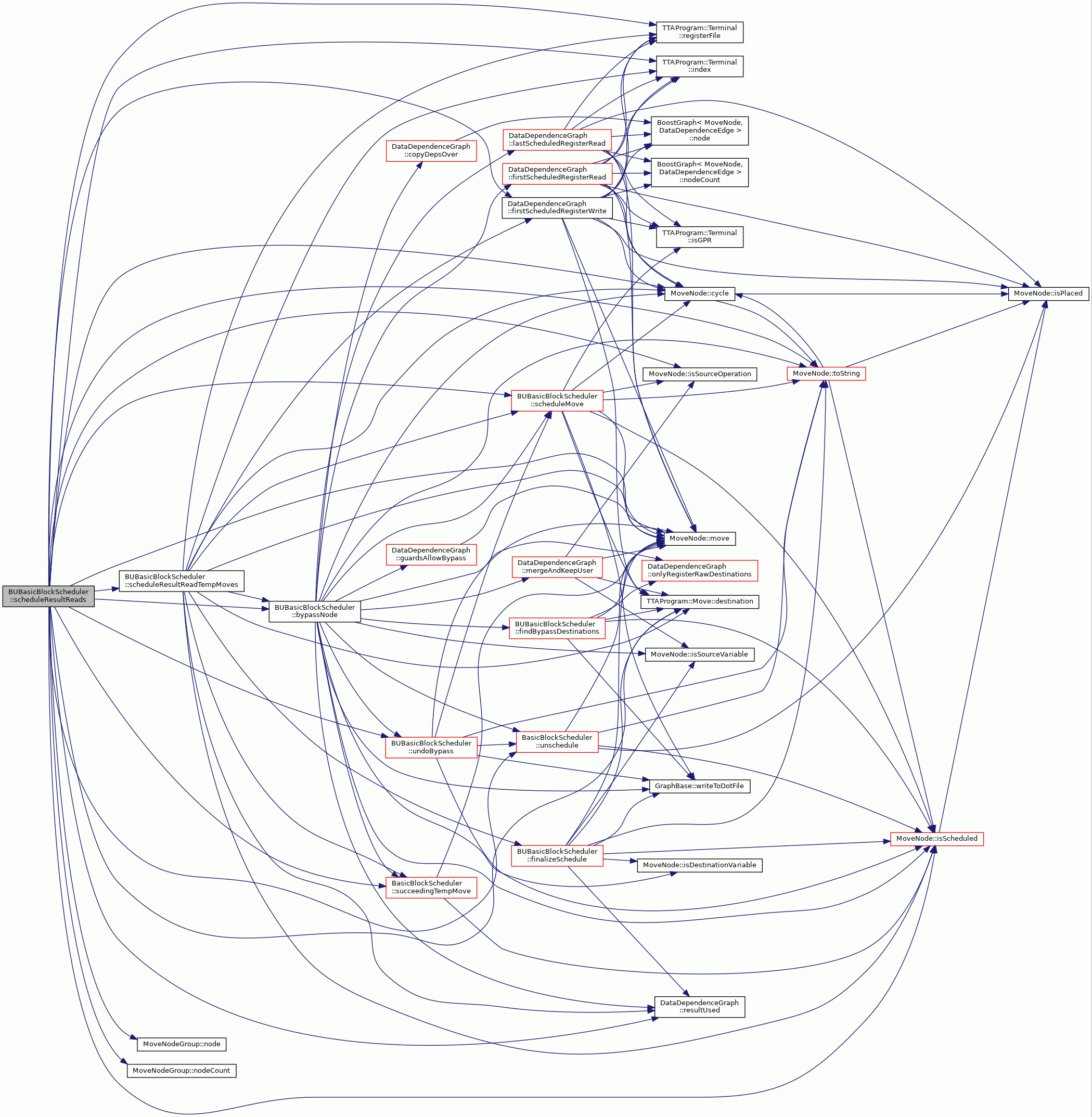
◆ scheduleResultReadTempMoves()
|
protected |
Schedules the (possible) temporary register copy moves (due to missing connectivity) preceeding the given result read move.
The function recursively goes through all the temporary moves added to the given result move.
- Parameters
-
resultMove A temp move whose predecessor has to be scheduled. resultRead The original move of which temp moves to schedule. firstWriteCycle Recursive function parameter.
Definition at line 1228 of file BUBasicBlockScheduler.cc.
References assert, bypass_, bypassNode(), MoveNode::cycle(), BasicBlockScheduler::ddg_, TTAProgram::Move::destination(), dre_, endCycle_, finalizeSchedule(), DataDependenceGraph::firstScheduledRegisterWrite(), TTAProgram::Terminal::index(), MoveNode::isScheduled(), MoveNode::move(), TTAProgram::Terminal::registerFile(), DataDependenceGraph::resultUsed(), BasicBlockScheduler::scheduledTempMoves_, scheduleMove(), scheduleResultReadTempMoves(), BasicBlockScheduler::selector_, and BasicBlockScheduler::succeedingTempMove().
Referenced by scheduleResultReads(), scheduleResultReadTempMoves(), scheduleRRMove(), and scheduleRRTempMoves().
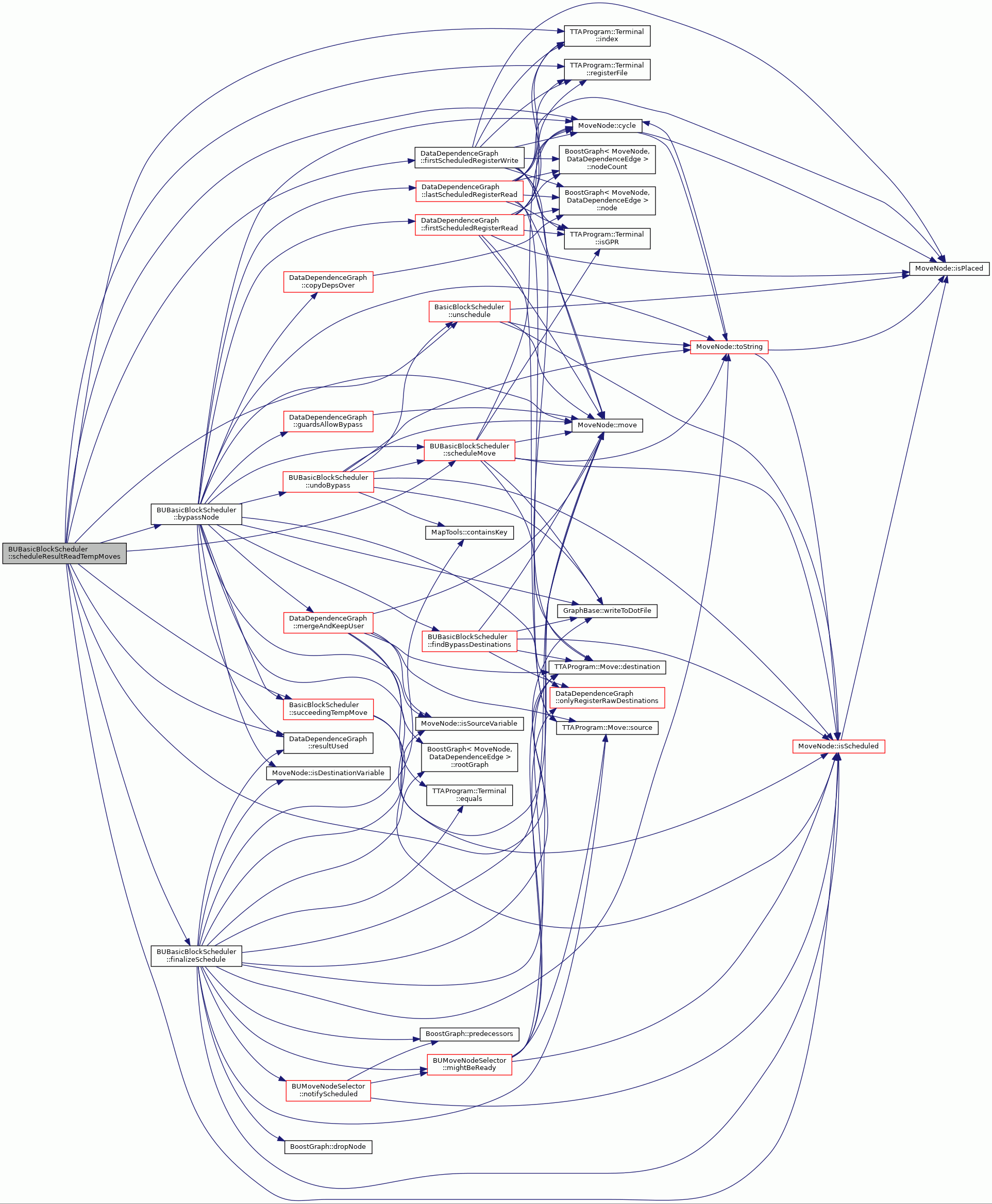
◆ scheduleRRMove()
|
protected |
Schedules moves in a single operation execution.
Assumes the given MoveNodeGroup contains all moves in the operation execution. Also assumes that all inputs to the MoveNodeGroup have been scheduled.
- Parameters
-
moveNode R-R Move to schedule.
Definition at line 911 of file BUBasicBlockScheduler.cc.
References RegisterCopyAdder::addRegisterCopiesToRRMove(), RegisterCopyAdder::AddedRegisterCopies::count_, BasicBlockScheduler::ddg_, TTAProgram::Move::destination(), endCycle_, TTAProgram::Terminal::equals(), SchedulerPass::interPassData(), MoveNode::move(), BoostGraph< GraphNode, GraphEdge >::name(), BasicBlockScheduler::rm_, scheduleMove(), scheduleResultReadTempMoves(), BasicBlockScheduler::selector_, DataDependenceGraph::setCycleGrouping(), TTAProgram::Move::source(), and GraphBase< GraphNode, GraphEdge >::writeToDotFile().
Referenced by handleDDG(), and handleLoopDDG().
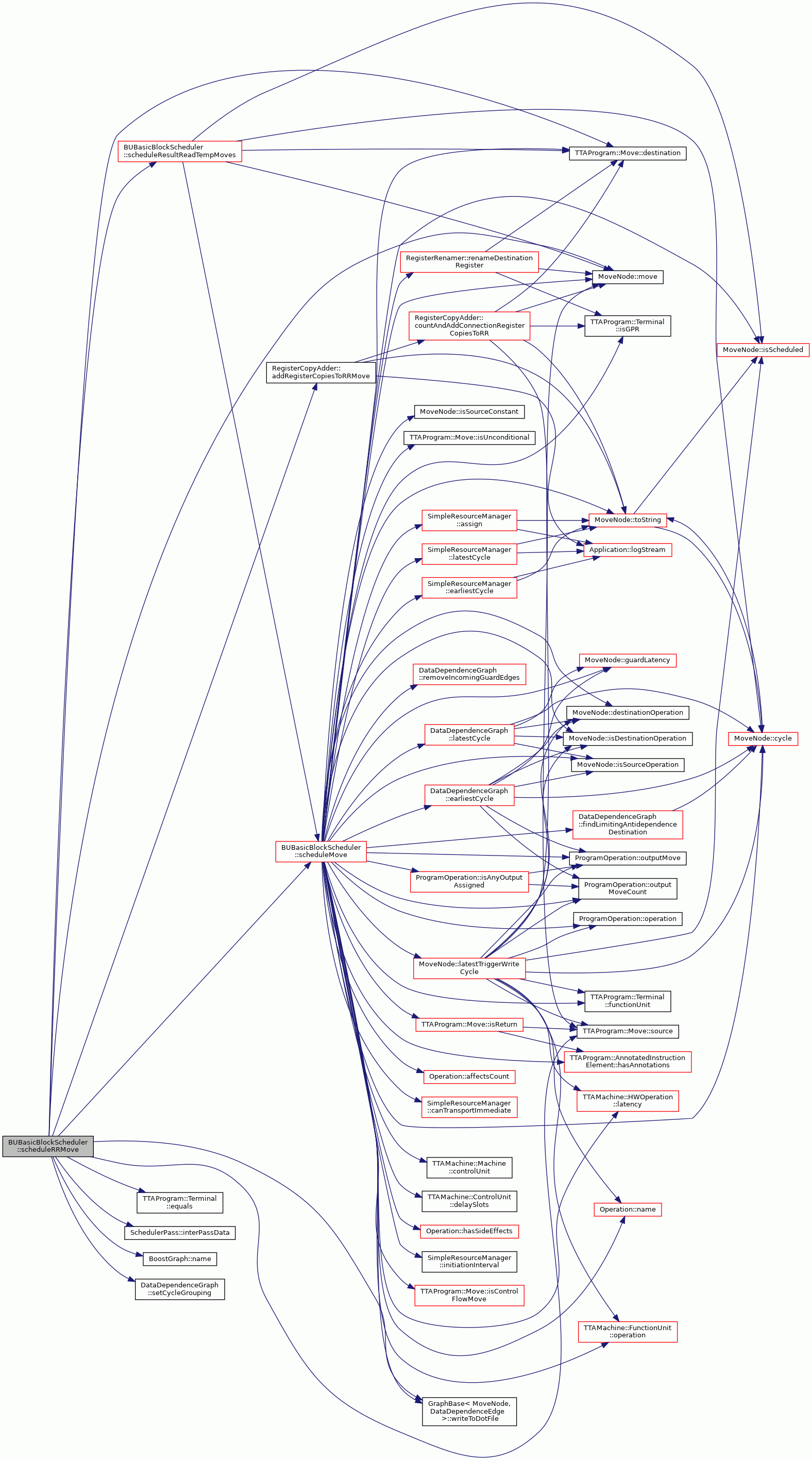
◆ scheduleRRTempMoves()
|
protected |
Schedules the (possible) temporary register copy moves (due to missing connectivity) succeeding the given RR move.
The function recursively goes through all the temporary moves added to the given RR move.
- Parameters
-
regToRegMove A temp move whose successor has to be scheduled. firstMove The original move of which temp moves to schedule. lastUse Recursive function parameter, it should be set as 0 for the first function call.
Definition at line 1365 of file BUBasicBlockScheduler.cc.
References assert, bypass_, bypassNode(), MoveNode::cycle(), BasicBlockScheduler::ddg_, TTAProgram::Move::destination(), dre_, endCycle_, finalizeSchedule(), DataDependenceGraph::firstScheduledRegisterWrite(), TTAProgram::Terminal::index(), MoveNode::isScheduled(), MoveNode::move(), TTAProgram::Terminal::registerFile(), DataDependenceGraph::resultUsed(), BasicBlockScheduler::scheduledTempMoves_, scheduleMove(), scheduleResultReadTempMoves(), BasicBlockScheduler::selector_, BasicBlockScheduler::succeedingTempMove(), MoveNode::toString(), and GraphBase< GraphNode, GraphEdge >::writeToDotFile().
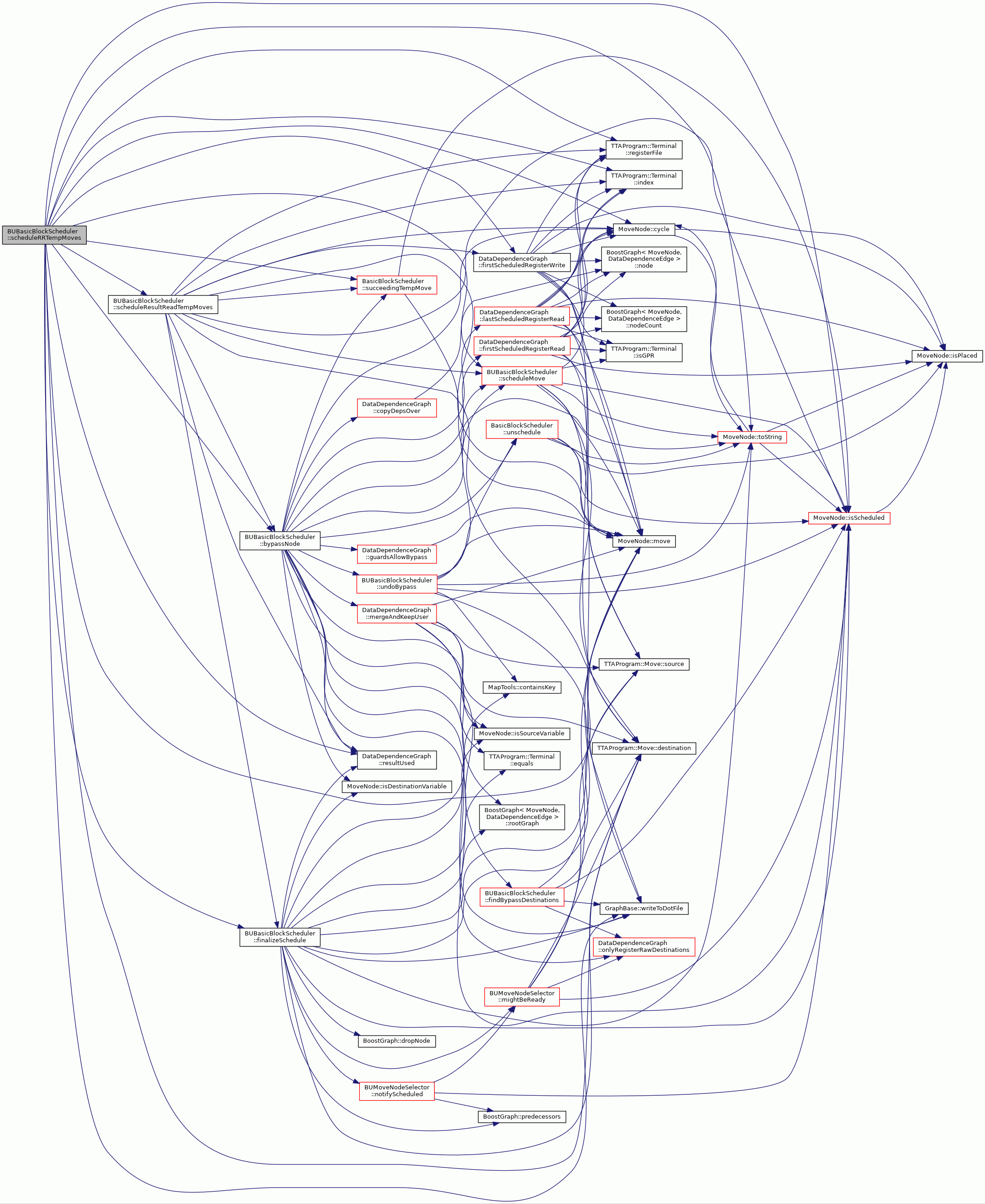
◆ shortDescription()
|
virtual |
A short description of the pass, usually the optimization name, such as "basic block scheduler".
- Returns
- The description as a string.
Reimplemented from BasicBlockScheduler.
Definition at line 1196 of file BUBasicBlockScheduler.cc.
◆ tryToOptimizeWaw()
|
protected |
Tries to get rid of WaW dependence from unconditional to conditional.
if the conditional move's result is overwritten by the cond for all users, make the unconditional move conditional, with opposite guard.
Definition at line 1977 of file BUBasicBlockScheduler.cc.
References BoostGraph< GraphNode, GraphEdge >::connectNodes(), DataDependenceGraph::copyDepsOver(), DataDependenceGraph::copyIncomingGuardEdges(), DataDependenceGraph::copyOutgoingGuardWarEdges(), TTAProgram::CodeGenerator::createInverseGuard(), BasicBlockScheduler::ddg_, DataDependenceEdge::DEP_WAW, DataDependenceEdge::dependenceType(), DataDependenceEdge::EDGE_REGISTER, DataDependenceEdge::edgeReason(), endCycle_, DataDependenceGraph::exclusingGuards(), TTAProgram::Move::guard(), BoostGraph< GraphNode, GraphEdge >::inEdges(), MoveNode::isScheduled(), TTAProgram::Move::isUnconditional(), DataDependenceGraph::latestCycle(), MoveNode::move(), DataDependenceGraph::regRawSuccessors(), BoostGraph< GraphNode, GraphEdge >::removeEdge(), DataDependenceGraph::removeIncomingGuardEdges(), DataDependenceGraph::removeOutgoingGuardWarEdges(), scheduleMove(), TTAProgram::Move::setGuard(), BoostGraph< GraphNode, GraphEdge >::tailNode(), DataDependenceEdge::tailPseudo(), BasicBlockScheduler::targetMachine_, and BasicBlockScheduler::unschedule().
Referenced by scheduleMove().
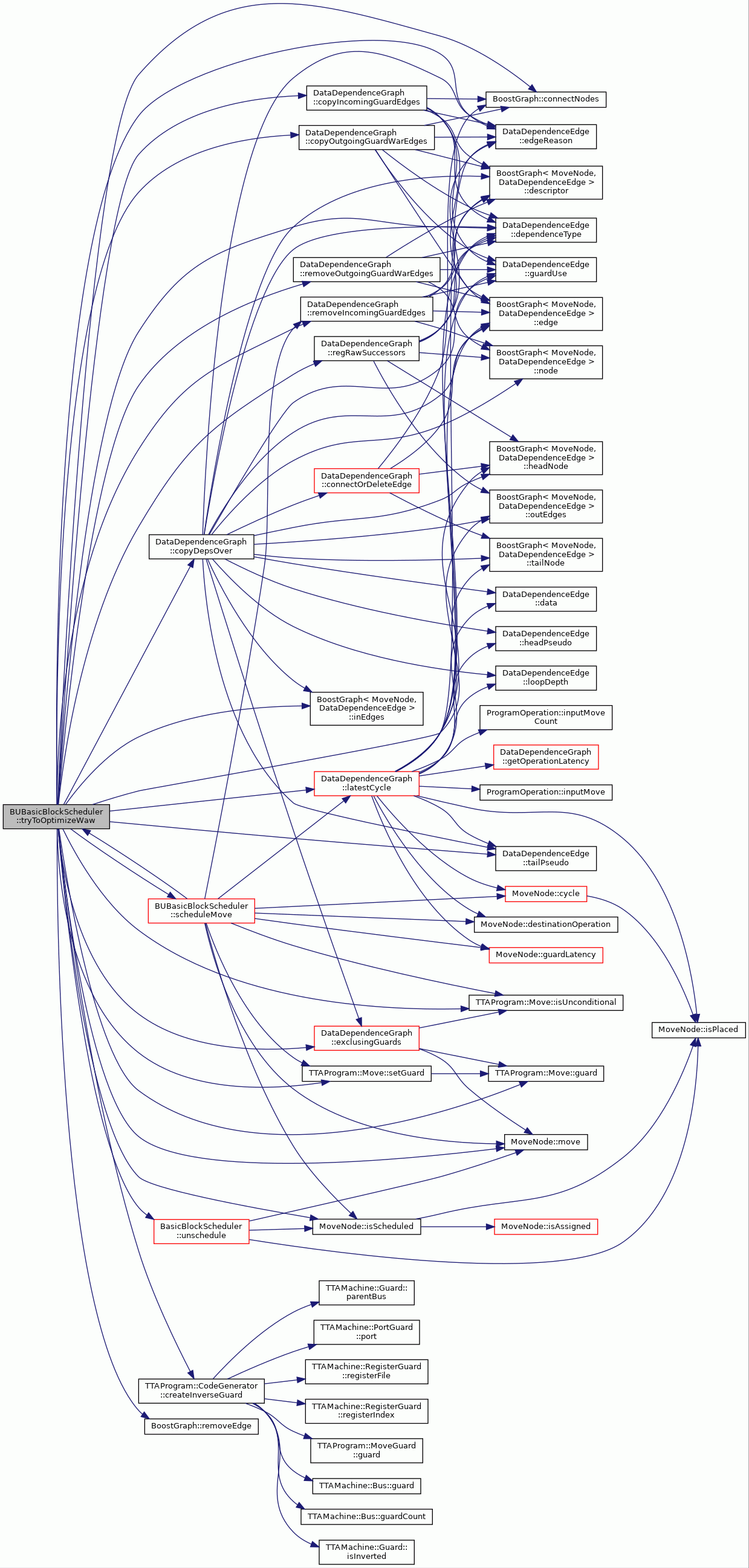
◆ tryToSwitchInputs()
|
protected |
If the operation is commutative, tries to change the operands so that the scheduler can schedule it better.
If the operation is not commutative, does nothing.
Which is better depends lots on the code being compiled and architecture which we are compiling for.
Current implementation tries to make constants triggers, and if there are no constant inputs, try to also change inputs so that last ready operand becomes trigger if it's near, but first ready operand becomes trigger if it's further (allows better bypassing of other operands) This seems to work in practice
- Parameters
-
po programoperation whose inputs to switch
- Returns
- true if changed inputs, false if not.
Definition at line 1909 of file BUBasicBlockScheduler.cc.
References Operation::canSwap(), BasicBlockScheduler::ddg_, TTAProgram::Move::destination(), BasicBlockScheduler::getTriggerOperand(), SimpleResourceManager::initiationInterval(), ProgramOperation::inputMove(), ProgramOperation::inputMoveCount(), MoveNode::isSourceConstant(), DataDependenceGraph::latestCycle(), MoveNode::move(), Operation::numberOfInputs(), ProgramOperation::operation(), TTAProgram::Terminal::operationIndex(), BasicBlockScheduler::rm_, ProgramOperation::switchInputs(), and BasicBlockScheduler::targetMachine_.
Referenced by scheduleOperation().
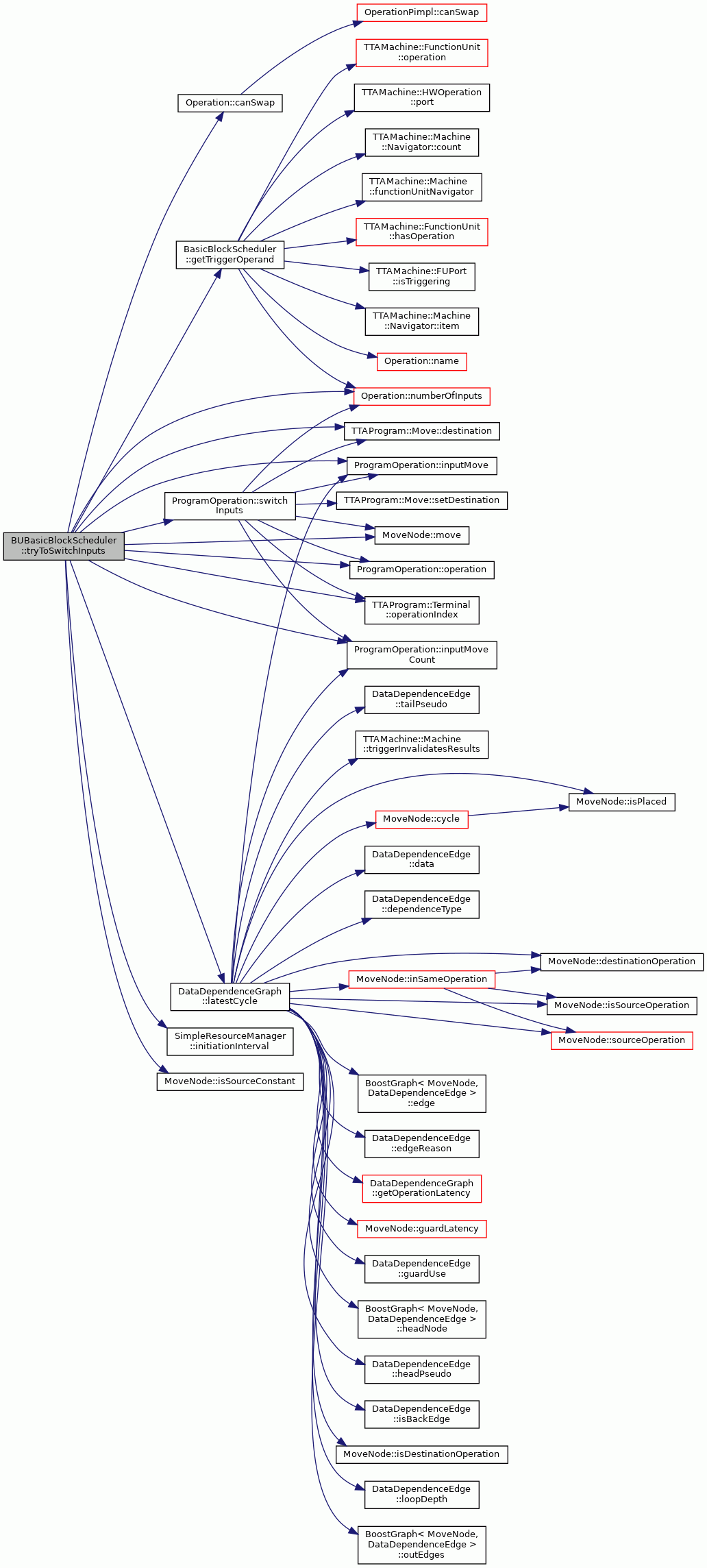
◆ undoBypass()
|
protected |
Remove all the bypasses of result write in moveNode and restore and schedule original moves.
Definition at line 1527 of file BUBasicBlockScheduler.cc.
References assert, bypassDestinations_, bypassDestinationsBus_, bypassDestinationsCycle_, MapTools::containsKey(), BasicBlockScheduler::ddg_, droppedNodes_, MoveNode::isScheduled(), MoveNode::move(), scheduleMove(), TTAProgram::Move::setBus(), MoveNode::toString(), DataDependenceGraph::unMergeUser(), BasicBlockScheduler::unschedule(), and GraphBase< GraphNode, GraphEdge >::writeToDotFile().
Referenced by bypassNode(), handleDDG(), scheduleOperation(), and scheduleResultReads().
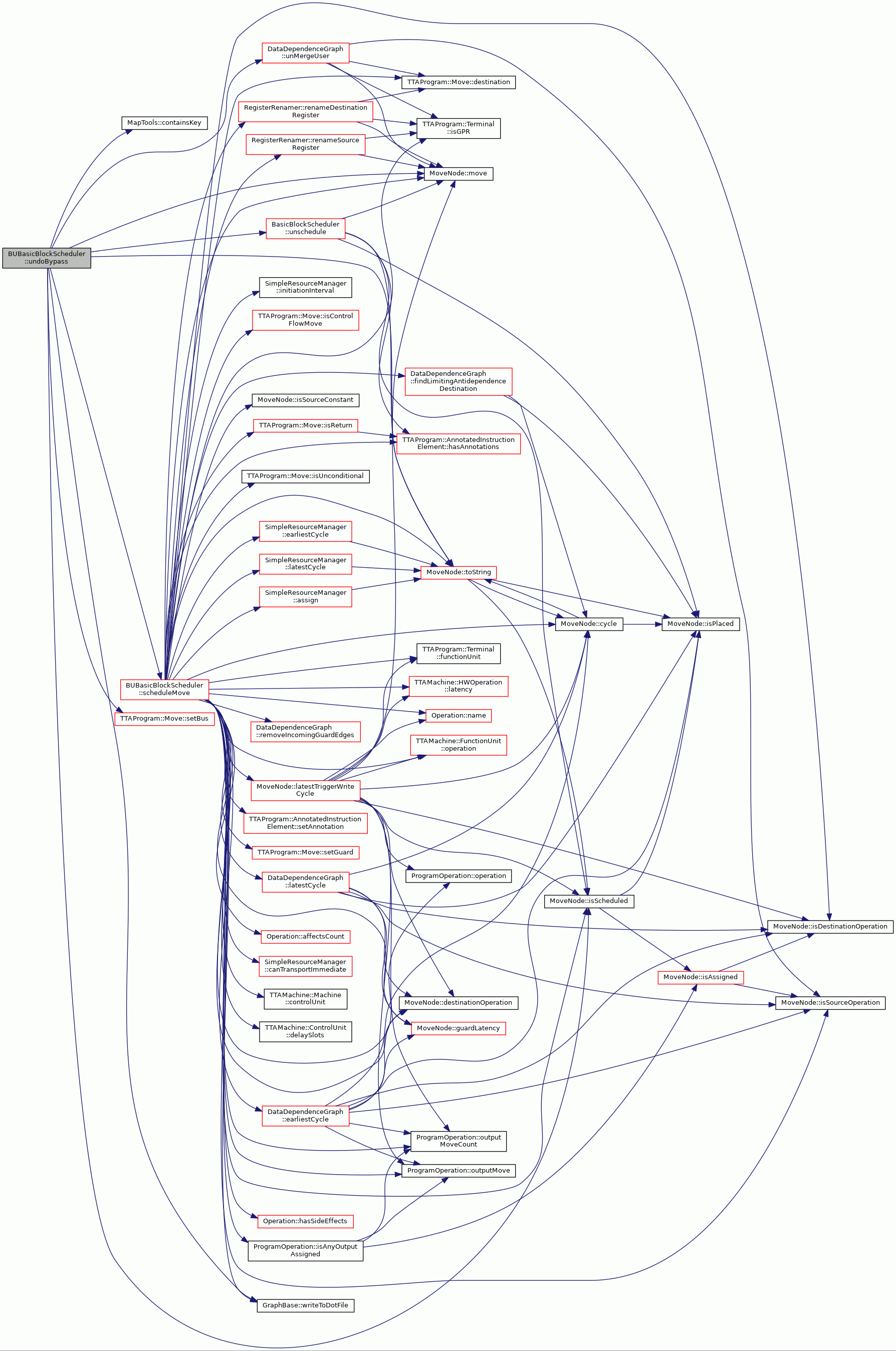
◆ unscheduleAllNodes()
|
protected |
Calls unschedule() for all ddg nodes, which were scheduled and remove possible bypasses.
Definition at line 1840 of file BUBasicBlockScheduler.cc.
References assert, bypassDestinations_, bypassDestinationsBus_, bypassDestinationsCycle_, BasicBlockScheduler::ddg_, droppedNodes_, MoveNode::isScheduled(), DataDependenceGraph::scheduledMoves(), DataDependenceGraph::scheduledNodeCount(), DataDependenceGraph::unMergeUser(), and BasicBlockScheduler::unschedule().
Referenced by handleDDG(), handleLoopDDG(), and scheduleOperation().
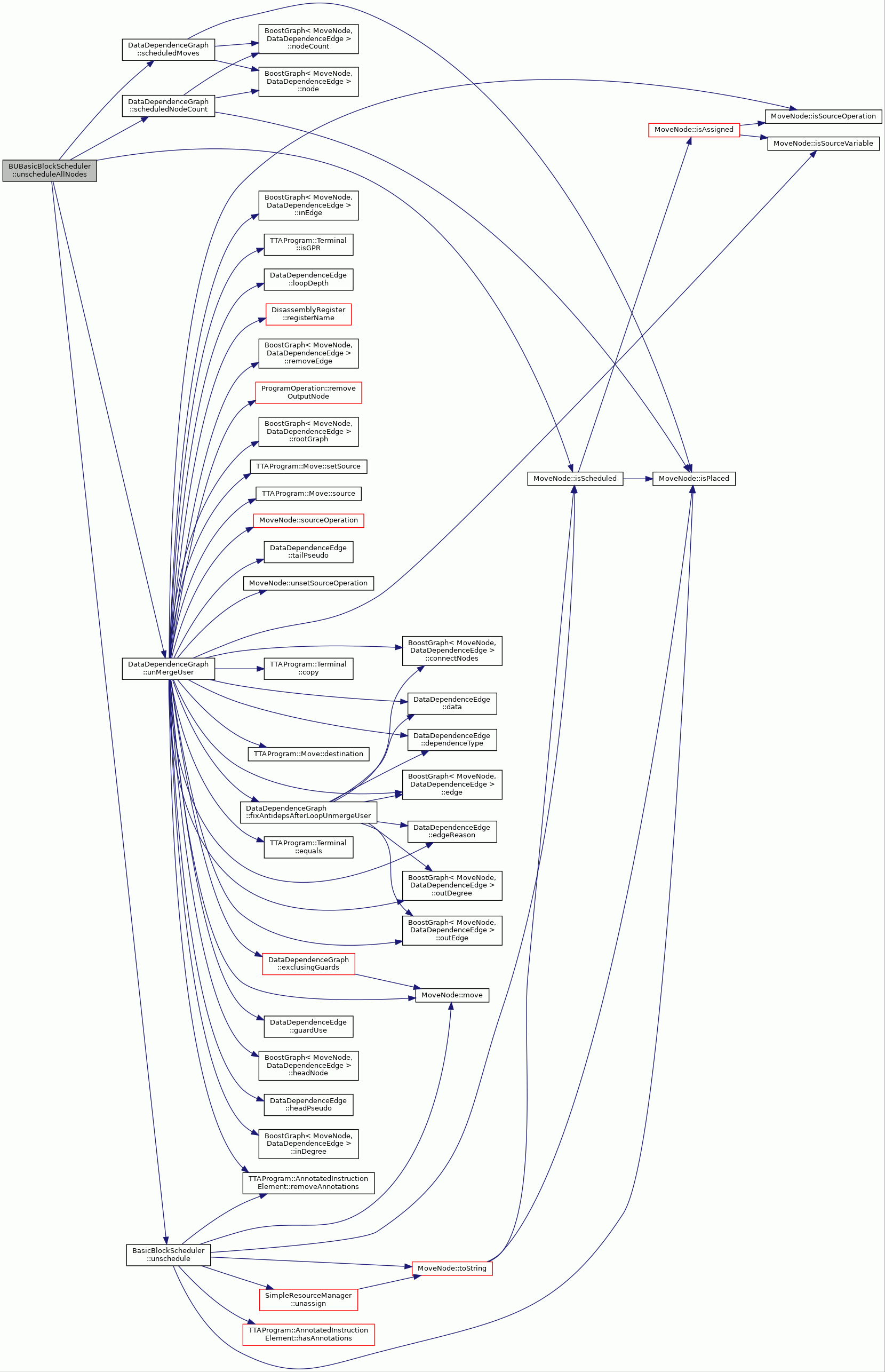
Member Data Documentation
◆ bypass_
|
protected |
Definition at line 155 of file BUBasicBlockScheduler.hh.
Referenced by bypassNode(), handleDDG(), handleLoopDDG(), scheduleOperation(), scheduleResultReadTempMoves(), and scheduleRRTempMoves().
◆ bypassDestinations_
|
protected |
Definition at line 145 of file BUBasicBlockScheduler.hh.
Referenced by bypassNode(), clearRemovedNodes(), finalizeSchedule(), undoBypass(), and unscheduleAllNodes().
◆ bypassDestinationsBus_
|
protected |
Definition at line 151 of file BUBasicBlockScheduler.hh.
Referenced by bypassNode(), clearRemovedNodes(), undoBypass(), and unscheduleAllNodes().
◆ bypassDestinationsCycle_
|
protected |
Definition at line 147 of file BUBasicBlockScheduler.hh.
Referenced by bypassNode(), clearRemovedNodes(), undoBypass(), and unscheduleAllNodes().
◆ bypassDistance_
|
protected |
Definition at line 157 of file BUBasicBlockScheduler.hh.
Referenced by bypassNode(), handleDDG(), handleLoopDDG(), and scheduleResultReads().
◆ dre_
|
protected |
Definition at line 156 of file BUBasicBlockScheduler.hh.
Referenced by finalizeSchedule(), handleDDG(), handleLoopDDG(), scheduleResultReads(), scheduleResultReadTempMoves(), and scheduleRRTempMoves().
◆ droppedNodes_
|
protected |
Definition at line 152 of file BUBasicBlockScheduler.hh.
Referenced by clearRemovedNodes(), finalizeSchedule(), undoBypass(), and unscheduleAllNodes().
◆ endCycle_
|
protected |
Definition at line 154 of file BUBasicBlockScheduler.hh.
Referenced by handleDDG(), handleLoopDDG(), scheduleInputOperandTempMoves(), scheduleMove(), scheduleOperation(), scheduleResultReadTempMoves(), scheduleRRMove(), scheduleRRTempMoves(), and tryToOptimizeWaw().
◆ jumpMove_
|
protected |
Definition at line 142 of file BUBasicBlockScheduler.hh.
Referenced by BUBasicBlockScheduler(), handleLoopDDG(), and scheduleMove().
The documentation for this class was generated from the following files: